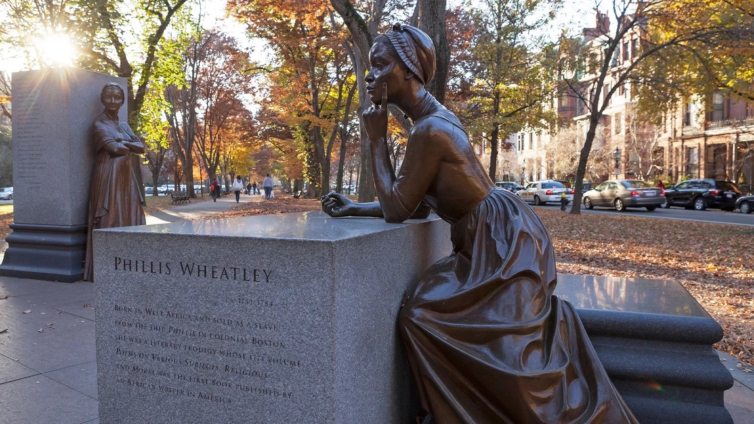When the Dartmouth sliced through the frigid waters of Boston Harbor on 28 November 1773, the Quaker-owned whaler carried a cargo that included 114 chests of British East India Company tea. Eighteen days later, the tea, along with 228 additional trunks from the soon-to-arrive Beaverand Eleanor, would play a starring role in the US Colonies' most iconic act of resistance, which ultimately led to the Revolutionary War.
In the Dartmouth's hold was another precious cargo: freshly printed copies of Poems on Various Subjects, Religious and Moral, a collection by Phillis Wheatley, the first enslaved person, first African American woman and third female in the US colonies to publish a book of poetry. Her life and work would become emblematic of the US struggle for freedom, a tale whose most visible representation – the Boston Tea Party, when American colonists protested Britain's "taxation without representation" by dumping tea into the harbour – celebrates its 250th anniversary this year.
Evan O'Brien, creative manager of the Boston Tea Party & Ships Museum, said, "Our mission, especially this year, is to talk not just about the individuals who were onboard the vessels, destroying the tea, but everyone who lived in Boston in 1773, including Phillis Wheatley."
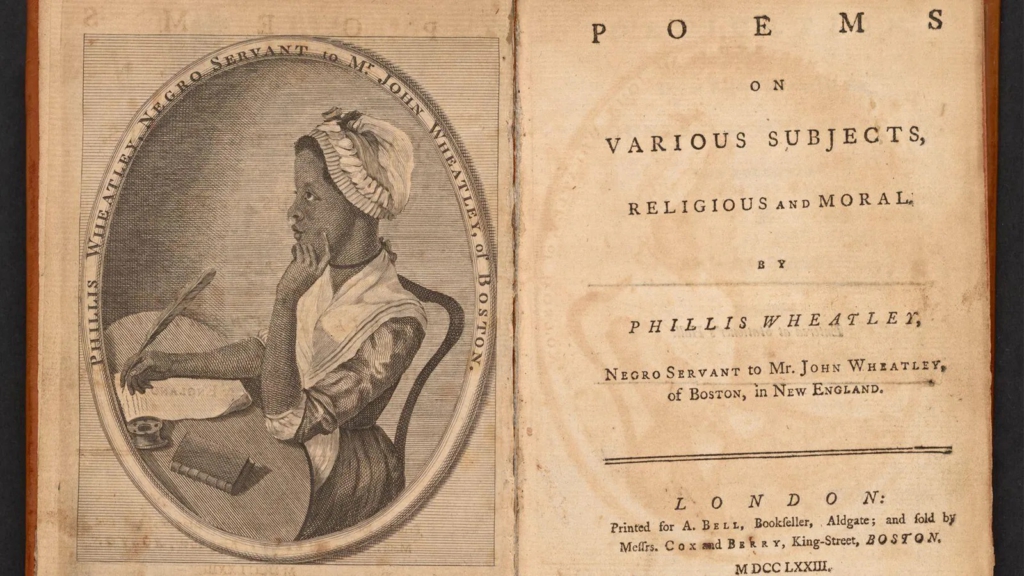
Actor Cathryn Philippe, who interprets Wheatley at the museum, connected with the poet's remarkable accomplishments. "You often hear about the tragedy of enslavement, which is a part of history that needs to be understood. But we don't hear much about the joy or successes of enslaved or formerly enslaved Africans."
Wheatley was born in what is now Senegal or Gambia and was abducted in 1761 when she was just seven or eight years old. Forced, along with 94 other Africans, aboard the slave-trading brigantine Phillis, she survived the treacherous Middle Passage, which claimed the lives of nearly two million enslaved people – including a quarter of the Phillis' "cargo" – over a 360-year period, and arrived on Boston's shores that summer.
We shouldn't hesitate to call her a genius
Frail after eight weeks at sea, the girl caught the attention of wealthy merchant and tailor John Wheatley. He purchased the child as a gift for his wife, Susanna, and renamed her after the vessel that had spirited her away from her home.
Phillis showed a natural aptitude for language. David Waldstreicher, professor of history at the City University of New York and author of the forthcoming biography The Odyssey of Phillis Wheatley, said, "She became fluent and culturally literate and able to write poems in English so quickly that we shouldn't hesitate to call her a genius."
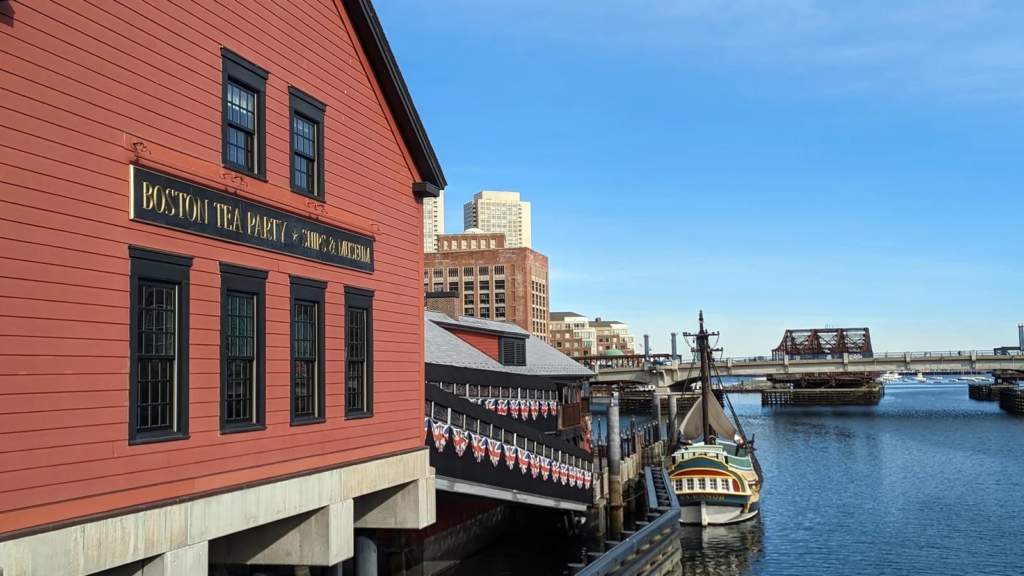
Although the Wheatleys were not abolitionists (they enslaved several people, and segregated Phillis from them) they recognised Phillis' talents and encouraged her to study Latin, Greek, history, theology and poetry. Inspired by the likes of Alexander Pope and Isaac Watts, she stayed up at night, writing heroic couplets and elegies to notable figures by candlelight. She published her first verse, in the Newport Mercury, at age 13.
While many New Englanders took note of the poet's gifts, no American printer would publish a book by a Black writer. Poems on Various Subjects was eventually financed by Selina Hastings, Countess of Huntingdon, and published in London. As a 19-year-old in 1773, Phillis travelled to the city, escorted by the Wheatleys' son. She was an instant sensation. Her celebrity, along with England's criticism of a new nation that simultaneously subjugated her while comparing its own relationship to the Crown as slavery, led the Wheatleys to manumit her in 1774.
A keen observer, Phillis frequently wrote about significant moments in America's fight for independence, carefully walking a fine line between being overtly political or critical of the colonial government as a Black woman. As a 14-year-old in 1768, she praised King George III in the poem To the King's Most Excellent Majesty for repealing the Stamp Act. Two years later, in On the Death of Mr. Snider Murder'd by Richardson, she memorialised the killing of 12-year-old Christopher Snider by a Massachusetts-born Loyalist during a protest over imported British goods.
Soon after, in 1770, a skirmish between Colonists and British soldiers erupted in front of the Old State House, not far from where Phillis lived on King Street, culminating in the Boston Massacre. Today, a circle of granite pavers, its bronze letters dulled by age and thousands of footsteps, marks the spot where blood was spilled. Following the incident, Phillis was inspired to write the poem On the Affray in King Street, on the Evening of the 5th of March, 1770.

Scholars estimate that Phillis produced upwards of 100 poems. Because her work makes few references to her own condition and is often couched in Christian concepts and the extolling of popular figures of the day, she has sometimes been dismissed as a white apologist.
Ade Solanke, a writer and Fulbright Scholar whose play Phillis in London will be performed in Boston later this year, said, "I think the biggest misconception about her is that she wasn't an abolitionist. You think of Frederick Douglass, Harriet Tubman, people who were explicitly condemning slavery and going to war against it. But the act of writing poetry as a Black woman in this time period was pretty radical."
Wendy Roberts, a University at Albany professor who recently discovered a lost Wheatley poem in a Quaker commonplace book in Philadelphia, agrees. "I don't think any deep reader of Wheatley comes away thinking she's an apologist. She was asserting herself, her agency, her wish for freedom, her presence as a person."
Most buildings in Boston with a direct connection to Phillis' life no longer stand. Some were razed by a pair of fires in the 18th and 19th Centuries, and others have been replaced by urban renewal in the mid-1900s. The Old South Meeting House, a stately Georgian red-brick church built in 1729 and tucked between glass-and-concrete skyscrapers on Washington Street, is an exception.
Besides being Phillis's place of worship, it was a cradle of philosophical debate, and served as planning headquarters for the Boston Tea Party. It now operates as a museum, with a statue of the poet flanked by exhibits on other ground-breaking figures from the pre-and post-Revolutionary eras.
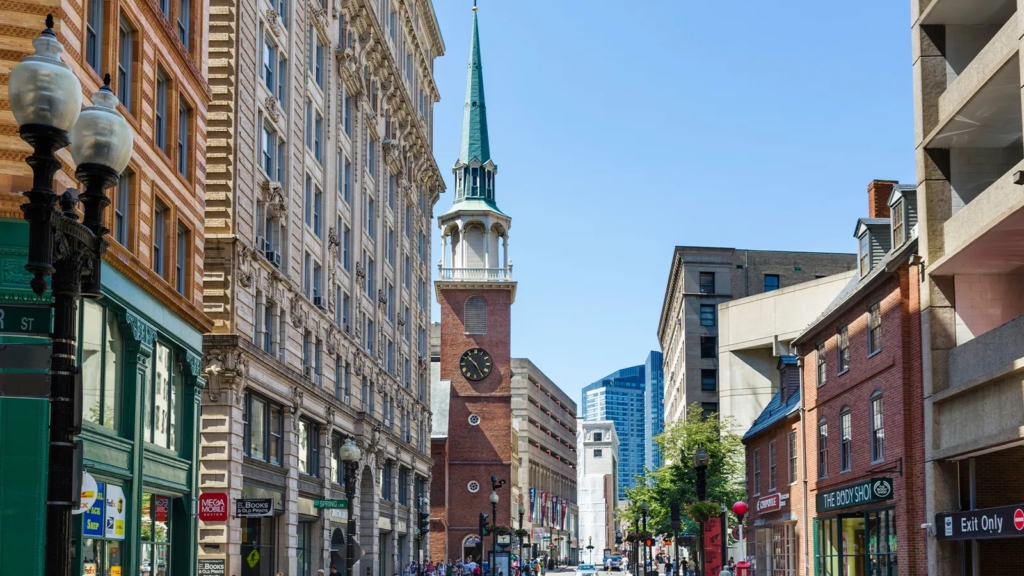
The writer almost certainly strolled through 50-acre Boston Common, the country's oldest public park (and site of the newly unveiled, and controversial, statue honouring Civil Rights icons Martin Luther King and Coretta Scott King). Phillis may have conducted the Wheatley family's shopping at Faneuil Hall, once the city's main marketplace for household goods – and located next to where enslaved people were once sold. It's now a retail centre, where visitors can pick up souvenirs, sample a variety of foods, or take a tour with a guide outfitted in 18th-Century breeches, waistcoat and tricorne hat.
Some experts speculate that Phillis participated in funeral processions for Snider and the five victims of the Boston Massacre, in which their coffins were paraded from Faneuil Hall to the Granary Burying Ground – also the final resting place of Revolutionaries like Samuel Adams, John Hancock and Paul Revere. Sombre and quiet, the cemetery bears more than 2,000 slate, greenstone and marble gravestones, many carved with traditional Puritan motifs like blank-eyed death's heads and frowning angels.
Phillis, who died in poverty after developing pneumonia at age 31, is thought to be buried in an unmarked grave, with her deceased newborn child, at Copp's Hill, in Boston's North End neighbourhood. An elegant statue of her, alongside renderings of women's rights advocate Abigail Adams and abolitionist Lucy Stone, holds court over the Commonwealth Avenue Mall. This year, when a replica of the Dartmouth sails into the Boston Tea Party & Ships Museum on Griffin's Wharf, it will host a permanent exhibit on the poet.
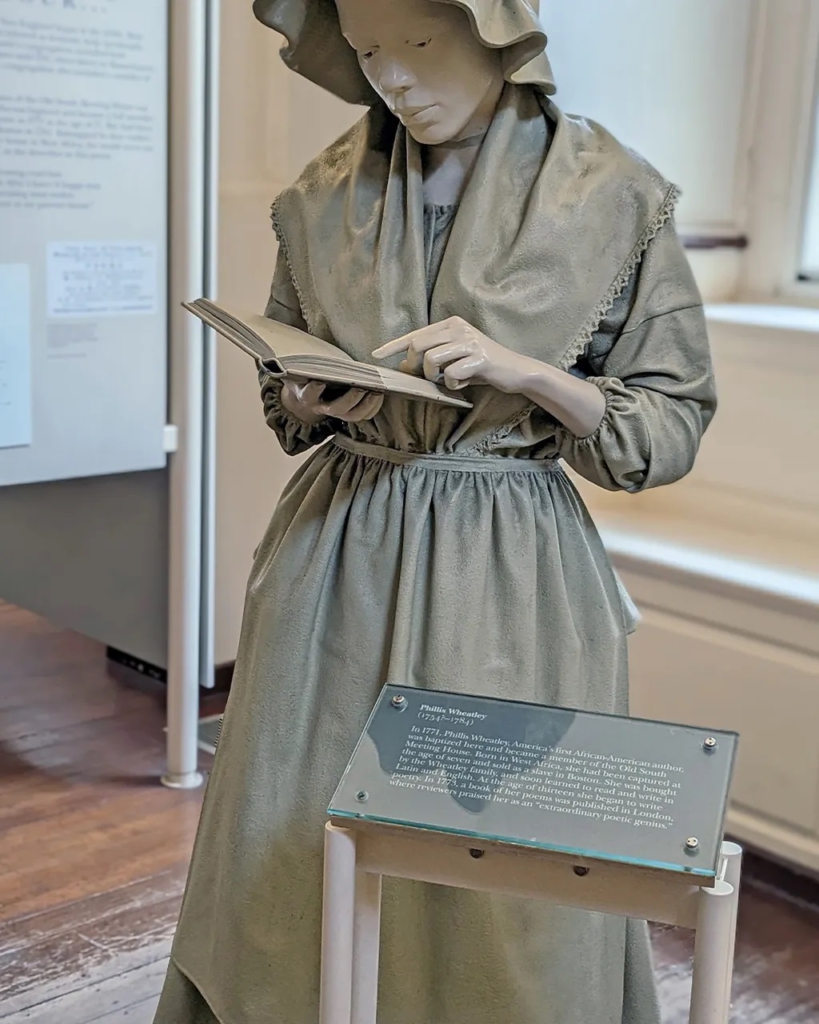
Phillis's legacy is perhaps best experienced in the work of contemporary artists. As part of the 250th-anniversary celebrations, Revolution 250, a consortium of 70 organisations dedicated to exploring Revolutionary history, will host a variety of performances and exhibits, including a full-scale re-enactment of the Tea Party on 16 December. Several events will honour the poet, among them a photography exhibit by Valerie Anselme, who will recreate Phillis' frontispiece that adorned the original publication of Poems on Various Subjects.
Artist Amanda Shea, who frequently hosts spoken word events and poetry readings around the city, explained that, in many ways, she is carrying on a legacy pioneered so long ago. "I feel like I'm part of the continuum of Phillis Wheatley. It's really important to be able to write and tell our stories. It's our duty as artists to reflect the times in which we live."
Rediscovering America is a BBC Travel series that tells the inspiring stories of forgotten, overlooked or misunderstood aspects of the US, flipping the script on familiar history, cultures and communities.
Latest Stories
-
T-bills: Interest rates increased for first time since January 1; government fails to meet target
21 mins -
Ghana retains 10th position with lowest fuel price in Africa
28 mins -
Will Ghana’s democracy stand the test of time in the 2024 elections?
4 hours -
Hindsight: Dreams fairytale run proved one thing; it is possible
5 hours -
God makes rulers, not you; you can’t choose your successor – Mahama to Akufo-Addo
6 hours -
Contributors own SSNIT, they must decide who becomes its Director-General – Austin Gamey
7 hours -
Move away from theory-based learning towards practical learning approaches – AUCC President to students
7 hours -
Haaland scores as Manchester City beat Nottingham Forest
8 hours -
Villas-Boas elected Porto president
8 hours -
Situation on frontline has worsened, Ukraine army chief says
8 hours -
US doctor describes witnessing starvation in northern Gaza
8 hours -
CAFCC: RS Berkane make final after USM Alger refused to play 2nd leg over Moroccans’ jersey
8 hours -
Elon Musk in China to discuss enabling full self driving
8 hours -
PSG clinch Ligue 1 title after Lyon’s win over Monaco
11 hours -
Guinness Ghana sets the pace at Ghana Beverage Awards with six awards
11 hours

